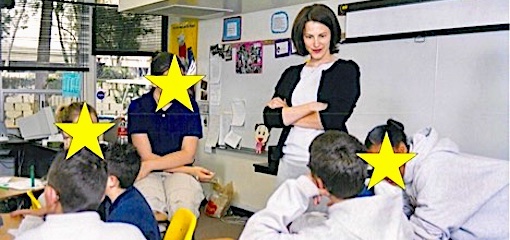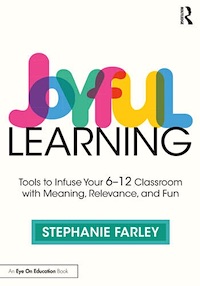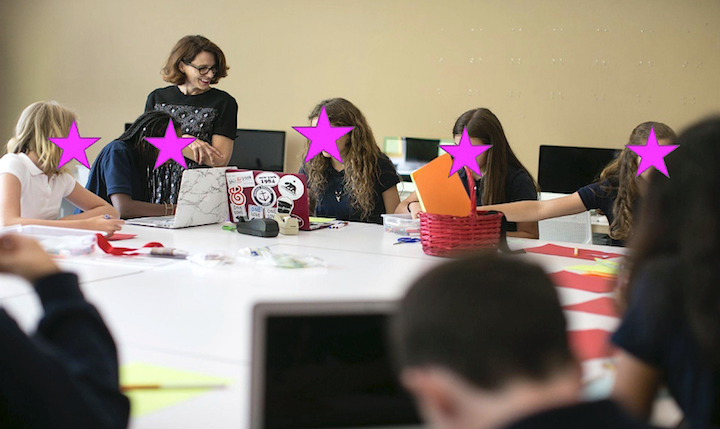Teaching: The Best Job I Never Wanted
By Stephanie Farley
 I’m getting close to my 30th year of being a teacher and working in education. Three decades is a LONG TIME. As I grow older, I find myself getting a little more sentimental than I used to be and also more inclined to reflect on the extraordinary combination of luck and circumstance that led me to where I am now.
I’m getting close to my 30th year of being a teacher and working in education. Three decades is a LONG TIME. As I grow older, I find myself getting a little more sentimental than I used to be and also more inclined to reflect on the extraordinary combination of luck and circumstance that led me to where I am now.
As an undergraduate student, I studied psychology and my plan was to be a research psychologist. I even started a PhD program in experimental psychology! Alas, I realized I didn’t find meaning in being a lab grunt, left the PhD program, and returned to my former school to get a Master’s degree in English literature.
My friend Jen, meanwhile, had studied education as an undergraduate and planned to be an elementary teacher. When it was time to seek gainful employment, armed with my English degree, Jen advised me to consider secondary teaching. I scoffed!
Maybe I’d teach community college. But as no employers vied for my amazing talents in analyzing the significance of magic in One Hundred Years of Solitude, I realized that Jen may just have been onto something. She introduced me to the world of emergency credentials and independent secondary schools, and within a few months I had my first teaching job.
I taught AP English Literature, Algebra II, and World History. If this sounds slightly ridiculous, it was. I had no idea how to teach anything, much less math. I was one page ahead of the students. But the next year I got a job teaching 7th grade English, and, simply put, I was home. I’d stumbled into the best job I never wanted.
I share this convoluted story about how I became a teacher not only because I’m apparently evolving into a sentimental fool, but also because I wish to counter the narrative that teaching is the worst job ever. I’m aware of the alarming headlines and the questionably sourced notion that almost half of new teachers leave within the first 5 years (countered by this 2015 article).
I’ve also seen the “TeacherTired” memes on Instagram about why teaching is the cruelest profession. And yet…there are opportunities within teaching for deep meaning, purpose, and connection like no other job.
As a 24 year old, I entered teaching with the idea that it would be a “for now” gig, until I found something “better.” As a 54 year old, I am flooded with gratitude for the wise administrators who saw my potential, took a chance on me, and ultimately provided me with a framework for a powerfully engaging, ever-evolving vocation.
Here’s why teaching turned out to be the best job I never wanted.
Meaning
The fact that teaching gave me a sense of meaning and purpose is intuitive: children are the future, so it follows that an opportunity to shape the future = meaning.
What I didn’t bargain for is how moved I would be by high school seniors calling out the positive influence of my friend Kathy in their senior speeches, or by the awe I’d feel watching kids joyfully dance – choreographed by my other friend named Kathy. I didn’t realize how it would buoy me to see my shy, socially withdrawn students passionately advocate for Brazil’s universal health care in my friend Ellen’s Social Justice class.
Of course it was meaningful when I received an encouraging note from a student or family (I’ve saved every single one!), but seeing students transformed by the work of my colleagues was a clearer window into the magic of teachers. What we did mattered, and I knew it because the kids told us with their words and actions.
Mastery
It’s immensely satisfying to master a skill. I rarely get to “genius” level on the NY Times’ game Spelling Bee, but when I do…heaven. Teaching is really, really hard, and therefore it’s really, really easy to talk yourself into just “getting by.”
For years I told myself that it was okay I wasn’t reaching a few of my students. That, in fact, it was normal…the notion of the bell curve practically decreed that a few kids wouldn’t perform well. But eventually I discarded this view and committed myself to teaching and evaluating in a way that allowed every single student to find success.
Students’ end-of-year reflections on what they had learned in English class was the most affirming literature I’ve ever read. Further, those reflections served as evidence that I had mastered the skill of helping students grow as readers and writers. Nothing compares to this feeling, not even “genius” level on Spelling Bee!
Connection
Connection is another obvious plus for teaching: many people will tell you that relationships with kids are the reason they started and continue teaching. A quick story: I subbed a few weeks ago and had a great time hanging out with the kids. Yet, for days afterward my mind was trying to solve the problem of how I could connect more effectively with one of the students in that class. Obviously, I’m not that kid’s teacher, yet my failure to fully understand that student in the 60 minutes we were together bothered me, because learning only happens in a social, emotional, and cognitive context.
If I get another chance to sub, I’ll have a new strategy with that student. Teaching affords us the amazing opportunity to connect with kids, and as a result of that connection, support the cognitive, social, and emotional development of those students. This is a deeply meaningful way to spend your time.
Novelty and Positive Emotions
An experienced teacher once told me that teaching is the only job in which you get to start fresh each year. That idea has stayed with me over the decades, and when September rolls around I experience the same mix of anticipation and excitement on the first day of school as I did almost 30 years ago. Every cohort of students brings with it a new set of challenges and delights…a new set of puzzles to solve. I love this element of the work!
Accordingly, I try to bring freshness to students and colleagues, as novelty widens the aperture of attention and allows us to engage more deeply. While meaning guides our decision-making and mastery helps us feel competent, novelty and adventure bring zest to our work while increasing our sense of well-being. I’m an evangelist for intentionally cultivating positive emotions in and out of class, which I do through stunt teaching, framing events through curiosity, wonder, and awe, and cracking jokes at bad times.
The reasons I listed above of why teaching is a great job are also components of joyful learning, a subject I wrote a book on last year. It makes sense that joyful learning and a joyful vocation would share elements. Let’s look at them again:
- Meaning
- Mastery
- Connection
- Positive Emotions
The only area missing from the list is “autonomy,” and that’s because I’m sensitive to the fact that autonomy has been removed for teachers in some states, and that even recommending a book to a student can be fraught with peril (I laud you, wonderful librarians!). We know from research that adults and kids value having choices in their lives, so if your particular teaching job allows you autonomy, that’s a win.
Optimism
I’ve been fortunate enough to have a great deal of agency in my work life, and I extended that agency to my students by allowing them to select their own reading, write about what they wanted, and evaluate themselves, too. As a result, my students were successful and content.
After all this time, I remain optimistic about the possibilities of education to have positive – even transformative – impacts. I still dream of visiting schools in Finland to see (and steal!) what they’re doing, and I still want to make every single kid I come into contact with feel seen, acknowledged, and confident in their ability to grow. I may have been a reluctant adventurer when I started teaching, but this profession has given me the gifts of meaning, mastery, connection, and positive emotions, which is joyful, indeed.

8th Grade English, 2018. Same here: I didn’t enjoy the photographer in the room, but as always my students say stuff that makes me laugh.

Stephanie’s first book is Joyful Learning: Tools to Infuse Your 6-12 Classroom with Meaning, Relevance, and Fun (Routledge/Eye On Education, 2023). She has created professional development for schools around reading and curriculum and coaches teachers in instruction, lesson planning, feedback, and assessment. Visit her website Joyful Learning and find her other MiddleWeb articles here.




































